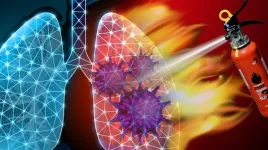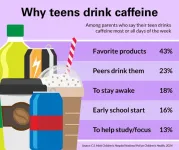(Press-News.org) VANCOUVER, Wash. – Using more robots to close labor gaps in the hospitality industry may backfire and cause more human workers to quit, according to a Washington State University study.
The study, involving more than 620 lodging and food service employees, found that “robot-phobia” – specifically the fear that robots and technology will take human jobs – increased workers’ job insecurity and stress, leading to greater intentions to leave their jobs. The impact was more pronounced with employees who had real experience working with robotic technology. It also affected managers in addition to frontline workers. The findings were published in the International Journal of Contemporary Hospitality Management.
“The turnover rate in the hospitality industry ranks among the highest across all non-farm sectors, so this is an issue that companies need to take seriously,” said lead author Bamboo Chen, a hospitality researcher in WSU’s Carson College of Business. “The findings seem to be consistent across sectors and across both frontline employees and managers. For everyone, regardless of their position or sector, robot-phobia has a real impact.”
Food service and lodging industries were hit particularly hard by the pandemic lockdowns, and many businesses are still struggling to find enough workers. For example, the accommodation workforce in April 2024 was still 9.2% below what it was in February 2020, according to U.S. Bureau of Labor Statistics. The ongoing labor shortage has inspired some employers to turn to robotic technology to fill the gap.
While other studies have focused on customers’ comfort with robots, this study focuses on how the technology impacted hospitality workers. Chen and WSU colleague Ruying Cai surveyed 321 lodging and 308 food service employees from across the U.S., asking a range of questions about their jobs and attitudes toward robots. The survey defined “robots” broadly to include a range of robotic and automation technologies, such as human-like robot servers and automated robotic arms as well as self-service kiosks and tabletop devices.
Analyzing the survey data, the researchers found that having a higher degree of robot-phobia was connected to greater feelings of job insecurity and stress – which were then correlated with “turnover intention” or workers’ plans to leave their jobs. Those fears did not decrease with familiarity: employees who had more actual engagement with robotic technology in their daily jobs had higher fears that it would make human workers obsolete.
Perception also played a role. The employees who viewed robots as being more capable and efficient also ranked higher in turnover intention.
Robots and automation can be good ways to help augment service, Chen said, as they can handle tedious tasks humans typically do not like doing such as washing dishes or handling loads of hotel laundry. But the danger comes if the robotic additions cause more human workers to quit. The authors point out this can create a “negative feedback loop” that can make the hospitality labor shortage worse.
Chen recommended that employers communicate not only the benefits but the limitations of the technology – and place a particular emphasis on the role human workers play.
“When you’re introducing a new technology, make sure not to focus just on how good or efficient it will be. Instead, focus on how people and the technology can work together,” he said.
END
Robot-phobia could exasperate hotel, restaurant labor shortage
2024-05-20
ELSE PRESS RELEASES FROM THIS DATE:
Study offers new detail on how COVID-19 affects the lungs
2024-05-20
In some severe cases of COVID-19, the lungs undergo extreme damage, resulting in a range of life-threatening conditions like pneumonia, inflammation, and acute respiratory distress syndrome. The root cause of those wide-ranging reactions in the lungs has until now remained unclear.
A new study by researchers at Columbia and the Columbia University Irving Medical Center sheds light on this mystery. The study found that ferroptosis, a form of cell death first named and identified at Columbia in 2012, is the major cell death mechanism that underlies COVID-19 lung disease. The finding indicates that deliberately halting ...
Body’s ‘message in a bottle’ delivers targeted cancer treatment
2024-05-20
Researchers at Karolinska Institutet in Sweden have succeeded in delivering targeted cancer treatment via small membrane bubbles that our cells use to communicate. A new study published in Nature Biomedical Engineering shows that the treatment reduces tumour growth and improves survival in mice.
When our cells communicate, they send out small membrane bubbles known as extracellular vesicles which contain various signalling molecules. Interest in these tiny bubbles, sometimes referred to as the body’s ...
1 in 4 parents say their teen consumes caffeine daily or nearly every day
2024-05-20
ANN ARBOR, Mich. – A quarter of parents report that caffeine is basically part of their teen’s daily life, according to a national poll.
Two in three parents think they know whether their teen’s caffeine intake is appropriate and which products have too much caffeine. Yet a third aren’t able to identify recommended caffeine limits, according to the University of Michigan Health C.S. Mott Children’s Hospital National Poll on Children’s Health.
“Our report suggests parents may not always be aware of how much they should be limiting caffeine consumption for teens,” said poll co-director and Mott ...
What makes some brown algae shimmer and others not?
2024-05-20
Compartments of consistently sized, tightly packed microspheres are what makes some brown algae shimmer like opal. The Kobe University discovery not only sheds light on the mechanism behind the alga’s structural coloration, it is also the first to spot the effect in an order of brown algae other than the two where it was known to occur.
Most brown algae are indeed yellowish-brown, but scuba divers noticed that a species resembling Sporochnus in the order Sporochnales shimmers like peacock feathers in yellow, ...
Seeking stronger steel, systematic look at 120 combinations of alloy elements provides clues
2024-05-20
Decarbonization of automobiles not only requires a shift from gasoline engines to electric motors, but also quality steel parts that help the motors run while lessening the weight of vehicles. High-performance steel materials can offer quieter rides and resist the wear and tear from high-speed rotation in motors. To create them, the process of modifying the steel surface with carbon, nitrogen, and alloy elements needs to be optimized.
To understand the interactions between elements in steel, a systematic investigation ...
Tricking the Brain’s inner GPS: Grid cells responses to the illusion of self-location
2024-05-20
Dr. Hyuk-June Moon from the Bionics Research Center at the Korea Institute of Science and Technology (KIST), in collaboration with Prof. Olaf Blanke’s team at the Swiss Federal Institute of Technology Lausanne (EPFL), has successfully induced self-location illusions with multi-sensory virtual reality (VR) in the MRI scanner and observed corresponding changes in the human brain's grid cell activity.
The brain is known to contain grid cells and place cells, which perform global positioning system (GPS) functions that allow us to recognize where we are. While ...
Gallbladder cancer rises among Black Americans as cases decline in other groups
2024-05-20
WASHINGTON, DC (May 20, 2024) — Gallbladder cancer rates have been stable or declining for most Americans over the last two decades, but cases have steadily risen among Blacks, with growing numbers not being diagnosed until later stages, according to a study scheduled for presentation at Digestive Disease Week® (DDW) 2024.
“Gallbladder cancer diagnosis at late stage can be highly detrimental,” said lead author Yazan Abboud, MD, internal medicine resident at Rutgers University New Jersey Medical School. “This could be due to a lack of timely ...
Biomarker for gastric cancer and other cancer studies set for digestive disease week
2024-05-20
Washington (May 14, 2024) — Cancer-related studies, including a diagnostic tool for gastric cancer and trends in gallbladder and colorectal cancers, will be presented this week at Digestive Disease Week (DDW) 2024. Abstracts are available to registered media, and press releases are available where noted. Studies are embargoed until 12:01 a.m. EDT the day of presentation, unless otherwise noted.
Here are summaries of the new research on the schedule:
Oral microbiome signatures as potential biomarkers for gastric cancer risk assessment, Abstract 949, will be presented Monday, May 20, at 4:15 p.m. EDT. (A press release is available upon request. Embargoed until 12:01 a.m. EDT ...
Endoscopic studies presented at Digestive Disease Week
2024-05-20
Washington (May 14, 2024) — Studies featuring endoscopic and laparoscopic procedures, including patient views on artificial intelligence in endoscopy and hazards to healthcare personnel of smoke-producing procedures, will be presented this week at Digestive Disease Week (DDW) 2024. Abstracts are available to registered media, and press releases are available where noted. Research is embargoed until 12:01 a.m. EDT the day of presentation, unless otherwise noted.
Here are summaries of the new research:
Patients’ sentiments ...
Hunger hormone, antibiotic-induced weight gain, and sleep and digestive health explored at Digestive Disease Week
2024-05-20
Washington (May 14, 2024) — Studies exploring the hunger hormone, weight-loss drugs, sauerkraut and antibiotic weight gain, the impact of physician gender on care, and the relationship between sleep patterns and digestive diseases will be presented this week at Digestive Disease Week (DDW) 2024. Abstracts are available to registered media. Embargos lift at 12:01 a.m. EDT on the day they are presented unless otherwise noted.
Here are summaries of the new research:
Performance of a machine-learning gene ...




